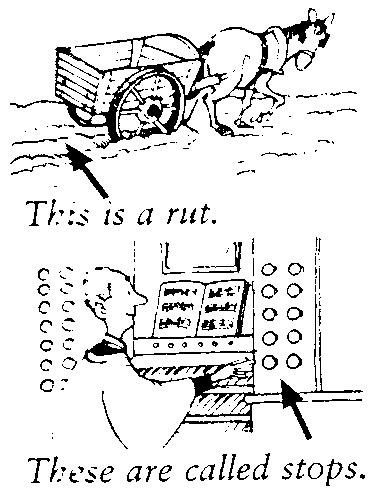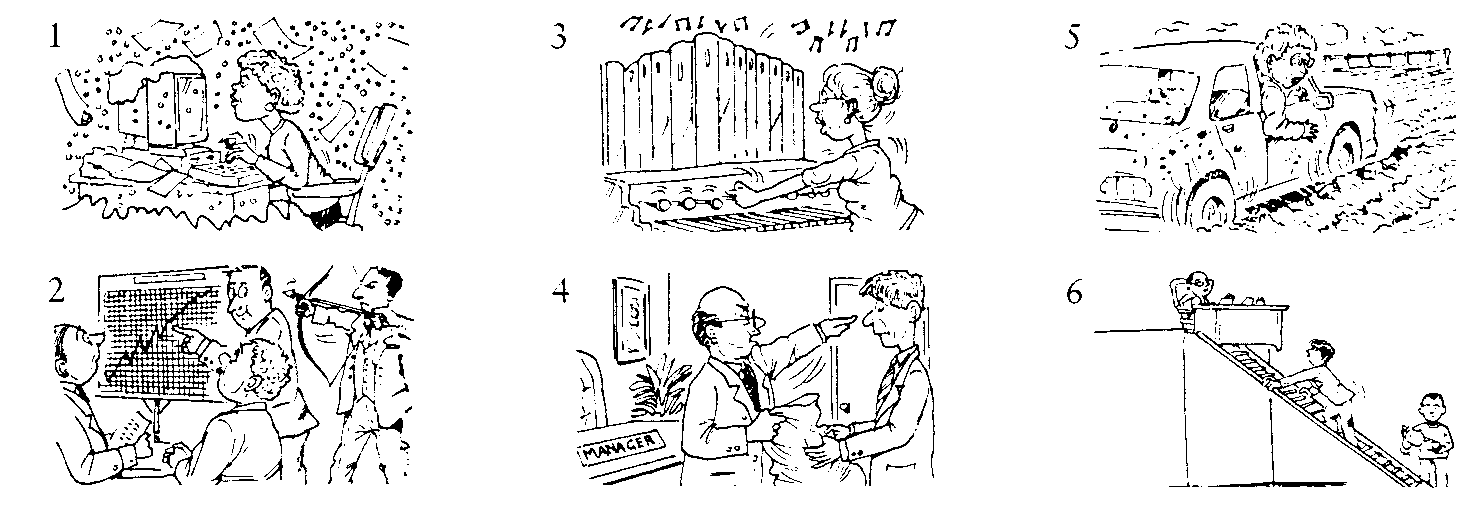
- •Introduction
- •1. How do you choose a career?
- •1.1. “Working” vocabulary
- •1.2. Choosing a career
- •Choosing a career
- •1.3. Career and personality
- •What is Your Career Personality?
- •Does My Personality Match this Career?
- •1.4. The 10 top steps for choosing a career
- •The 10 top steps for choosing a career
- •1. Begin with your values.
- •2. Identify your skills and talents.
- •3. Identify your preferences.
- •4. Experiment.
- •5. Become broadly literate.
- •6. In your first job, opt for experience first, money second.
- •7. Aim for a job in which you can become 110% committed.
- •8. Build your lifestyle around your income, not your expectations.
- •9. Invest five percent of your time, energy, and money into furthering your career.
- •10. Be willing to change and adapt.
- •1.5. Revision
- •2. Looking for a job
- •2.1. Work
- •2.3. Job search methods
- •Job search methods
- •2.4. Experience first, money second
- •My life as an intern
- •2.5. Revision
- •3. Applying for a job
- •3.1. Looking for and applying for a job
- •3.2. Want ads
- •3.3. How does a selection process go?
- •The Selection Process
- •Interview...
- •3.4. Getting ready for a job interview
- •Curriculum vitae
- •Interests
- •Personal statement
- •Covering letter
- •Mega Video Store requires trainee manager
- •16, London road,
- •23, High Road,
- •Planning
- •Writing
- •Checking
- •3.5. A job interview
- •3.6. Getting and keeping a job
- •3.7. Revision
- •4. At work
- •4.1. Career and promotion
- •One man's career
- •Being busy
- •Other idioms connected with work
- •During your working life
- •4.2. Colleagues and routines
- •Colleagues
- •Daily work routines
- •During the day (different work-patterns)
- •Types of work
- •4.3. Revision
- •5. The everchanging workplace
- •5.1. Revolution in the workplace
- •Recent changes in the world of work
- •Help wanted
- •5.2. The changing workplace
- •What makes a good workplace?
- •The Changing Workplace
- •5.3. Revision
- •6. Gender issues in the workplace
- •6.1. Men vs women
- •6.2. Gender stereotypes at work
- •6.3. Inequality at work
- •Inequality at work
- •6 .4. Gender discrimination in the workplace and at home
- •6.5. Balancing home and work
- •Balancing home and work
- •Value of housework
- •A Cinderella story
- •6.6. Revision
- •7. Check yourself
- •2. Write some collocations or brainstorm some related topics 1. Write a definition
- •Vocabulary Word
- •3. Use the word in a sentence or question 4. Recall a sentence with the word from the text.
- •Useful phrases
- •Writing a Summary Conflicting interests
- •Understanding the task
- •Deciding what is important
- •Answering questions to write a summary
- •Summarising a paragraph
- •Cutting out unnecessary information
- •6. Understanding the task
- •7. Planning
- •8. Writing
- •9. Checking
- •Presentation Signpost Expressions
- •Introducing the topic
- •Presentations. Structure and Useful Phrases
- •Introduction
- •Interpreting information
- •Discourse markers in speech and in writing
3.7. Revision
SPEAKING
Task 1. Mock interview.
Step 1. Prepare a want ad advertising some position. Job advertisements you have studied previously in this book can serve as examples. Remember to use your active vocabulary.
Step 2. Put your ads onto the blackboard. Work with your partner. Come to the blackboard and choose one of the ads. Decide what kind of an applicant might be the best one for this position (qualifications, skills, personal traits) and give your reasons why.
Step 3. Work with your partner and write two CVs of the candidates applying for the position advertised in the want ad, two covering letters and two personal statements. Decide which ones you’d choose to be the basis of your mock job interview. Prepare a dialogue-job interview provided that an interviewer is:
ill-humoured;
hard-to-please;
suspicious.
Learn the dialogue by heart and dramatise it in class.
4. At work
VOCABULARY PRACTICE
4.1. Career and promotion
Task 1. Study carefully all the given information and learn the vocabulary you have not been familiar with.
One man's career
When Simon started work, he was at the very bottom of the career ladder2. He had quite a dead-end job3 doing run-of-the-mill4 tasks. He stayed there for a couple of years, but then decided he had to get out of a rut5. He pulled out all the stops6 and managed to persuade his manager that he should be given more responsibility. The deputy manager got the sack7 for incompetence and Simon stepped into his shoes8. For several months he was rushed off his feet9 and he had his work cut out10 to keep on top of things. But he was soon recognised as an up-and-coming11 young businessman and he was headhunted12 by a rival company for one of their top jobs. Simon had climbed to the top of the career ladder13.

Being busy
To be rushed off your feet is just one way of saying that you are very busy at work. Here are some other idioms which give the same idea.

Other idioms connected with work
Plans for building the extension have been put on hold until our finances are in a better state.
[left until a later date (usually used in the passive)]
The plans look great on paper, but you never know quite how things will turn out, of course.
[when you read about it, but might not turn out to be so]
A lot of preparation has gone on behind the scenes for the opening ceremony for the Olympics. [in secret, often when something else is happening publicly]
Please don't talk shop. It's too boring for the rest of us.
[talk about work when you are not at work]
During your working life
In some countries, women are allowed maternity leave and men paternity leave if they're having a child. [time away from work to have a new baby]
What perks (informal) / (extra) benefits (formal) do you get in your job? [extra things apart from salary, e.g. a car]
How important is job satisfaction to you? [the feeling that your job is worth doing and fulfils you]
What's your holiday entitlement? [number of days you have the right to take as holiday]
Do you get regular salary increments? [formal: increases/rises]
Most people don't want to reach/hit a glass ceiling. [reach a level where you cannot get further promotion, even if you deserve it]
Most people think they are overworked and underpaid. [often said together as a humorous fixed expression]
Task 2. Complete each of these idioms with one word from Task 1.
The job looks good on ..................................................., but the reality is quite different.
I'd hate to work in a run-of-the-.................................................... job.
Mary has been up to ................................................... eyes in work all day.
When John retires, his son will................................................... into his shoes.
My cousin's an up-and-................................................... musician.
I must try to get out of a ................................................... at work.
I've been on the .............................................. all day.
Why did Kirsty's boss give her the ................................................... ?
I wish you wouldn't talk ................................................... all the time!
Rosie was very thrilled to be ...................................................hunted for her new job.
Task 3. Which idioms do these pictures make you think of?

Task 4. Match each idiom on the left with its definition on the right.
-
1 behind the scenes
very busy
2 dead-end
be dismissed
3 get the sack
make an effort
4 off the record
promising
5 on hold
hidden
6 pull out all the stops
unofficially
7 rushed off your feet
delayed
8 up-and-coming
without prospects
Task 5. Complete each of these idioms.
We had a difficult day at work today. We were all (1) ................................................... under because we are having some important visitors next week and management has decided to pull out all the (2) ................................................... to impress them. We are going to have our work (3) ................................................... out to get everything done in time. Long-term tasks have been put on (4) ................................................ so that everything is ready for our visitors. Anyone who objects has been told that they will (5) ........................................... the sack and everyone who wants to (6) ....................................... the career ladder will have their (7) ......................................... full until the week is over. The visitors would be horrified if they knew what was going on (8) ............................................ the scenes!
Task 6. Write sentences using six of the idioms from above about your own work at present and your hopes and plans for work in the future.
Task 7. Put these expressions into two groups: usually negative (-) and usually positive (+). Some of them are new expressions not in Task 1.
to hit a glass ceiling
to have a lot of perks
to be snowed under
to be demoted
to be passed over for promotion
to get turned down for a job
to be short-listed for a job
to be a high-flyer
Task 8. Some words here are not used correctly or in their usual way. Correct them.
I started studying French at university, but I didn't finish my career and left after one year.
My boss rose my salary with £2,000 a year. I was delighted.
I'm underpaid and overworked, like everybody! And I'm always stressed up.
My holiday titlement is four weeks a year.
He got maternity leave when his wife had a baby.
Task 9. Imagine you are a careers adviser. What advice would you give to someone who is ...
money motivated and who is prepared to take risks?
a very talented musician who is not necessarily money motivated?
an achiever who has a background in IT and is a very confident person?
suffering from a lack of job satisfaction in their present job?
Task 10. In your opinion what jobs are most honoured in the society and what jobs are most popular? Sometimes one has to start at the bottom of a career ladder to make it up to the top. Let’s see how you can make a loser job sound like a winner, which can help you in compiling a résumé.
How to make your loser job sound like a winner |
|
With a little creativity and a big thesaurus, any ordinary summer job can be dressed up to look like a top-notch position for you to put on a résumé or a college or job application. Here are some examples: |
|
Ice-cream scooper |
Frozen-foods marketing specialist |
Crossing guard |
Vehicular-flow technician |
Newspaper deliverer |
Communications-distribution engineer |
Lifeguard |
Director of aquatic-crisis management |
YM intern |
Youth-market analyst and adviser |
Baby sitter |
Infant-undergarment-replacement professional |
Look at the chart again and say what words can help you make a loser job sound like a winner. Can you add any other words to the list?
Now try to make the following jobs sound like top-notch positions:
a waiter
a dog walker
a supermarket cashier
a street-corner flier distributor
a receptionist
a pizza deliverer
the mascot of a local restaurant/ a sports team
a ball boy
VOCABULARY PRACTICE
